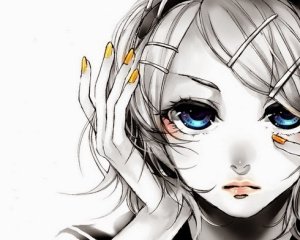
The acting was great. Han Hyo Joo (Oh Yeon Joo) and Lee Jong Suk (Kang Cheol) have great chemistry, and their wonderful sense of humor and wide range of emotions brought the romance to life. Not to go unmentioned, though, was the awesome Kim Eui Seong (Oh Sung Moo/Oh Yeon Joo's father) and other "secondary" characters. Each character had a story to tell, which was fitting since a big part of the storyline was about breaking free of pre-destined circumstances and deciding your own destiny.
My only complaint about the acting the fight scenes. Some of the fight scenes were okay, but the gun-shot victims were very unconvincing. Every time someone was shot, they would halt dramatically and fall back as if they had been stun-gunned. In case you didn't know, that's not what getting shot is actually like. Still, this was a minor complaint in comparison to the superior acting.
The music was definitely good but not the best aspect of the show. The music was well timed and carried the various moods well, and I'll be sure to look up the sound track after I finish this review :)
Other aspects of the show that can't go un-praised: the way the drama was filmed was stunning. The special effects were great, wonderfully incorporating the manhwa-drawing style with real life. The sequence of the storyline was also wonderful—instead of using flashbacks to repeat information over and over again, W did a great job of revisiting untold past. This definitely kept me on my feet—not so much because the storyline was unrealistically surprising (although there were many surprises) but because the producers played around with perception. Just when you think you know what's happening: BAM. New information changes your whole understanding of the situation. This effect also carried into the storyline itself as the characters tried to figure out the confusing logic of the two worlds.
Finally, the relationship between Oh Yeon Joo and her father was one of the highlights of the drama. Like I said, this drama was a romance story but it was also so much more. It was really about love in general—parental love as well as romantic. The loving relationship between Oh Yeon Joo and Kang Cheol was also great—yes, they did the whole "I love you so I'm sacrificing myself because I don't want to cause you pain" (even though this NEVER WORKS) thing, but they also figured out a way to be happy TOGETHER instead of just sacrificing themselves unnecessarily.
All in all, this drama was definitely worth recommending (like, DEFINITELY times a million!). My rewatch value is slightly lower just because you will be expecting the unexpected, but don't let this deter you! W is magnificent in all aspects and deserves all the praise that it can get! It was romantic, it was funny, it was suspenseful, and it was a new take on the parallel-worlds genre. 10/10 would recommend :)
Vond je deze recentie nuttig?
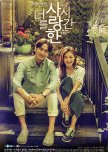
The Time We Were Not in Love
6 mensen vonden deze beoordeling nuttig
When I first started this drama, I was really excited. I love romantic stories where two friends discover that they have been in love all along, so I thought this drama would be really enjoyable. Contrary to what many others have said, I don't think that their relationship itself was boring. Ha Ji Won (Oh Ha Na) and Lee Jin Wook (Choi Won) are cute together, and they found the perfect balance between friendship and romantic love. I also liked how the story switched between present day and flashbacks to their time in high school—as the viewer, this allowed you to grow with their relationship and learn more about them throughout.
Now for the bad. The drama only revolved around the two main characters. There was very little personal growth/development of the secondary characters. When the drama introduced new characters, they only feel like obstacles to the main couple's relationship. The story was very repetitive—Oh Ha Na and Choi Won would find a perfect balance of friendship and begin to grow in their relationship, and then a new character would get in the way for a little while. That character, rather than growing, would just cause problems and then fade away. Then the couple would return to their happy lives before repeating the cycle all over again. Rather than learn from this never-ending cycle, Oh Ha Na and Choi Won didn't really grow as characters and instead dealt with each problem much in the same way.
Rather than being bored by this drama, I am just frustrated beyond belief. The acting is good but not spectacular (and Ha Ji Won did a lot of deer-in-the-headlights-staring instead of reacting emotionally). The music was also good but not great. Overall, the drama maybe had some underlying message about the trials of life (?) It was hard to say because there was very little development. My rewatch value is obviously low because I dropped the drama and have no desire to pick it up anytime soon.
If friendship-to-love romances are your thing and you have a high tolerance for frustrating characters, I would suggest you maybe try this drama (but don't take my word on that). Otherwise, I would suggest you try something else.
If you have finished this drama and want to refute my review, please leave a comment! Like I said, I dropped after 6 episodes so I'm interested to know if the drama changes. I'd love to know what other people think :)
Vond je deze recentie nuttig?
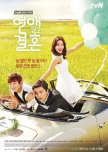
The story: I'm a sucker for cliches, so this plot line was right up my alley—the love-hate relationship between Jang Mi and Gi Tae was addicting (if not predictable), and the plot twists in their relationship were endlessly amusing. I really loved how the drama also focused on the other characters as well—the plot included a redemption arch for Gi Tae's mom, a happy ending for Hyun Hee and Hoon Dong, and a tidy ending for Se Ah and Yeo Reum. I'll admit that my hatred for a character reached new heights with Se Ah, but I also found myself pitying her and crying with her throughout her character development. That's the thing about 'Marriage, Not Dating': each (if not most) of the characters are complex with both a good and a bad side. On one hand, this makes them excruciatingly frustrating. But on the other hand, it makes them human and so much more relatable and lovable.
Acting: Han Groo (Jang Mi) and Woo Jin (Gi Tae) were absolutely amazing together! My heart soared when they smiled at each other, and I couldn't help but squeal (more than once) when they were finally a couple—they seemed genuinely comfortable together, and both their cute scenes and their intense fighting scenes (and everything in between) were very believable. The other actors/actresses did a wonderful job bringing their characters to life, each with their own personality and style.
Music: The soundtrack was classic love-song pop, sometimes upbeat and sometimes sappy. The instrumental music was great—the drama used a variety of sound effects to highlight the characters' actions and emphasize the element of comedy throughout the show.
Rewatch: This show would be a great rewatch, simply because the characters are so enjoyable. The storyline is full of drama but not necessarily suspenseful, making it the perfect angsty rewatch.
Overall: This drama hit great points about the value of love + the work that is required in maintaining a relationship. While the drama is full of cliches, the story takes a realistic approach to love—love (and any successful relationship) takes work and perseverance. A couple can live happily together, but the magical "happily ever after" doesn't really exist (as evident by the multiple 'plot twists' throughout the show). I would definitely recommend this drama for any romance lovers—if you're looking for a romantic melodrama, romantic comedy, or something wonderfully in between, then this is the show for you :)
Vond je deze recentie nuttig?
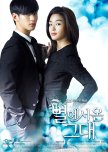
You Who Came from the Stars
3 mensen vonden deze beoordeling nuttig
Vond je deze recentie nuttig?

The story was excellent—it was filled with suspense, romance, comedy, action, and drama. The characters were amazing as well. Even though I wouldn't necessarily label this drama as a romantic comedy, the characters themselves all had a wonderful sense of humor. All of the characters (main and supporting) grew throughout the show, and I loved how their development continued throughout several plot arches. The acting was beautiful—Song Hye Kyo (Kang Mo Yeon) and Song Joong Yi (Yoo Shi Jin) have amazing chemistry, as do Jin Goo (Seo Dae Yeong) and Kim Ji Won (Yoon Myung Ji). Song Hye Kyo and Jin Goo also have a great bromance that I will sorely miss. The music was great, and I will be downloading the soundtrack as soon as I finish this review :)
Overall, the drama capitalized on the themes of duty and honor, which tied perfectly into the character's roles in the military/medical profession. My rewatch value rating is slightly lower (if a 9 can be considered low) only because the drama was very suspenseful (and some of that suspense will be lost with a rewatch). The camera-work of the drama was great though, and the drama would be well-worth rewatching just for the sake of the characters alone. If you are debating whether or not to watch this drama, I would DEFINITELY recommend you try it! Happy watching :)
Vond je deze recentie nuttig?
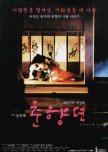
Deze recentie kan spoilers bevatten
WARNING: MAY CONTAIN SPOILERSI am aware that Chunhyang is a classic korean folktale, and I am aware that many people love and cherish this story. Well, here's why I'm not one of those people (and why that's okay):
Rather than a touching love story, Chun Hyang uses a classical star-crossed lovers trope to reinforce stereotypical gender roles and shame female sexuality. Mong Ryong plays the stoic, heroic man who is revered for his looks, intelligence, and status as a nobleman. Chun Hyang is the "ideal" confucian wife: shy and sexually innocent yet passionate in bed, intelligent and well-spoken, and ABOVE ALL completely devoted to her husband. The story constantly reinforces these roles: rather than display passion and mutual love, the wedding night scene is used to display Chun Hyang's "shyness" (which honestly comes off as reluctance or non consent) Mong Ryong's sexual prowess as he literally chases after Chun Hyang and takes her clothes off. Chun Hyang is continually shamed for her sexuality, and even when they are having sex Chun Hyang must play hard-to-get. Very few times does Chun Hyang initiate intimacy, and when she does it is to reinforce her role as the doting, dedicated wife. These gender roles continue when Mong Ryong is sent to Seoul: Chun Hyang is overcome with emotion and throws a temper tantrum while Mong Ryong remains the stoic scholar. Chun Hyang becomes a shell of a person and cannot continue to live a functional life without her husband—despite the fact that she was an accomplished woman (in writing, painting, sewing, and music) before she met Mong Ryong. In the end, Mong Ryong is excused after abandoning his wife for three years while Chun Hyang is revered for remaining chaste.
In the end, this story isn't a romantic tale of two lovers—it is a story of neglect, of dedication that threatens the mental and physical safety of Chun Hyang, and of sexual repression and public shaming that only reinforces the virgin/whore dichotomy.
Vond je deze recentie nuttig?

